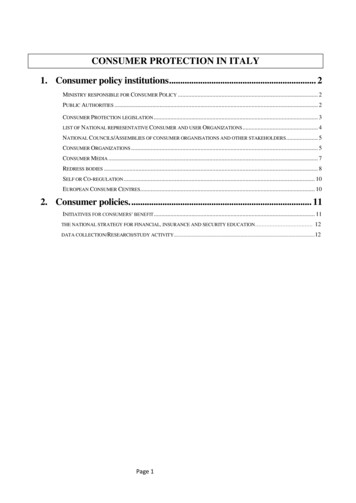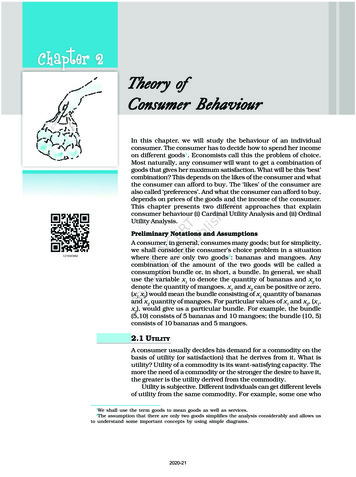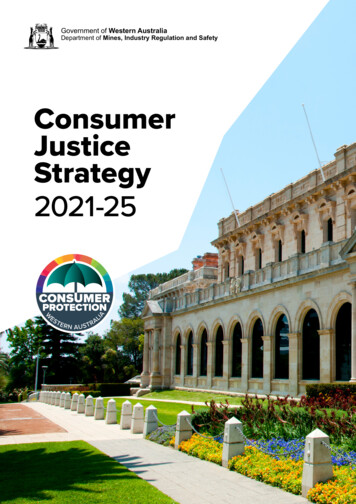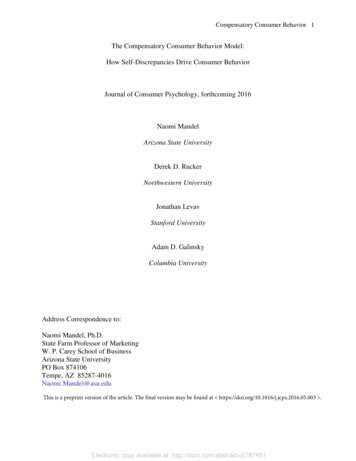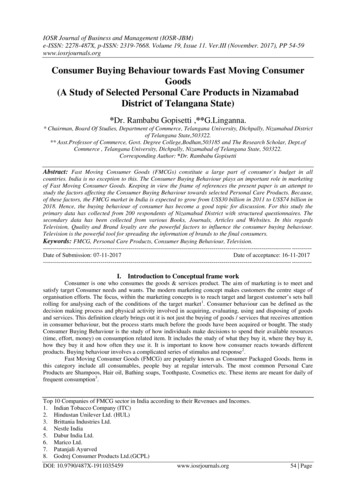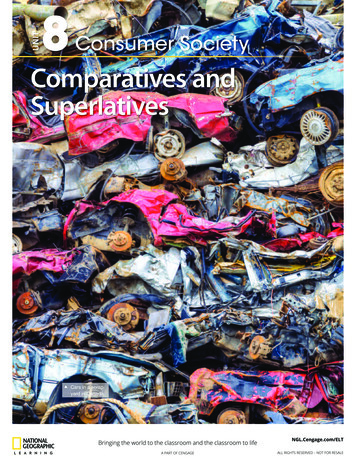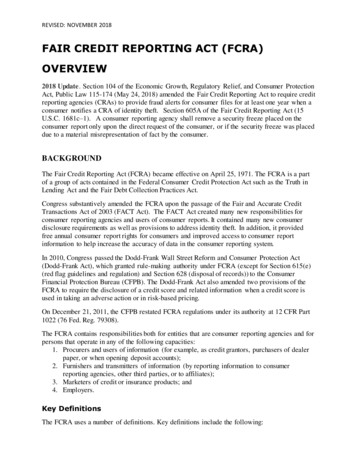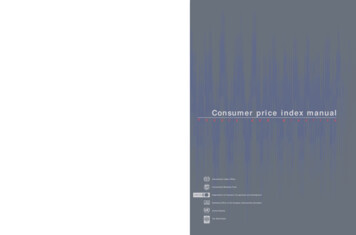
Transcription
A Consumer’s Guide toBuying a Co-op
A Consumer’s Guide toBuying a Co-opIn the United States, more than 1.2 million families of all income levels live inhomes owned and operated through cooperative associations. Housing co-opsare not a new concept. The first housing cooperative in the nation was organizedin New York City in the late 1800’s. Today, large numbers of housing co-ops arelocated in major urban areas such as Atlanta, Boston, Chicago, Detroit, Miami,Minneapolis, New York City, San Francisco, Seattle and Washington, DC.WHAT IS A HOUSING CO-OP?A housing co-op is people who together own or control the building(s) in which they live. Instead of buying “real” property, you buystock, or a membership, in a cooperative corporation. That corporation owns the building, land and any common areas.Think of a housing co-op as three cohesive, integrated segments, each with different functions: The members or shareholders (the residents) collectively own the building(s) and property through their shares in the cooperativecorporation. As a member, you are entitled to occupy a specific unit indefinitely or until you sell. Members democratically governthe cooperative corporation and elect a board of directors to oversee operations.As a member, you have exclusive rights to your unit through your occupancy agreement, or proprietary lease, with the cooperativecorporation. You agree to the cooperative’s bylaws, which stipulate that you pay a monthly fee toward the operation andmaintenance of the entire building(s). Your monthly fee is typically determined by your unit’s square footage, which also determinesthe amount of stock (or shares) you own in the cooperative corporation. Your voting rights will be determined by yourcooperative bylaws.Members with share loans (mortgages on their co-op unit) make individual principal and interest payments directly to their lenders. The cooperative corporation is the collective, legal body made up of the members of the co-op. The corporation owns all the realestate – the land, building(s) and any common areas. The corporation also carries a blanket insurance policy that covers damageto the cooperative property from hazards such as fire or water. However, additional homeowner’s insurance is recommended for allmembers to cover personal contents inside individual units. The board of directors is elected from the membership to manage the co-op and to give members a voice in their co-op.Sometimes, the board may hire a professional management company to oversee the operations, while other co-ops self-manageand set up committees to help run the co-op. In most co-ops, the board of directors interviews and approves prospective purchasersfor membership. Members view this as an opportunity for a prospective purchaser to meet with the board to discuss how thecooperative works and the available services and amenities, as well as to answer any questions about cooperative living.In addition, the board can terminate membership and evict residents who violate any part of the occupancy agreement.
What is the Differencebetween a Co-op and a Condo?OwnershipMonthly CostsCO-OPCONDOMembers own shares in a corporation,which in turn, owns the land and thebuilding(s). A member has the exclusiveright to occupy a specific unit in thebuilding.Residents own their own units in abuilding, instead of owning shares in acorporation.Members pay monthly fees or carryingcharges to the co-op. This pro rata sharecovers actual operating costs, blanketdebt principal and interest, property taxes,insurance and reserves. In some co-ops,utility costs are included as part of themonthly charges.Residents pay monthly condo fees tothe condo association. This represents apro rata share of actual operating costs,insurance and reserves.Residents with mortgages make principaland interest payments directly totheir lender.Community ControlFinancing BuildingImprovementsand ReplacementsMembers with individual share loans(co-op mortgages) make individualprincipal and interest payments directly totheir lender.Maintenanceand RepairsPurchase Priceand Move-in CostsFinancial LiabilityCONDOMembers democratically govern thecooperative and elect a board of directorsto oversee operations. Through theboard, the co-op has the right to approveall potential members. The co-opcan terminate membership and evictresidents who violate any part of theoccupancy agreement.Residents democratically govern the condoassociation and elect a board of directorsto oversee operations. However, the condoassociation has no control over the sale ofunits or approval of the new owners.Co-ops can pay for improvementsand replacements to the building(s)in three ways: Approve a special assessmentfor each individual member ona pro rata basis;Condos can pay for improvementsand replacements to the building(s)in three ways: Approve a special assessmentfor each individual unit owner; Establish and fund replacementreserves; or The co-op is responsible for exteriormaintenance. Typically, through its boardof directors, the co-op can choose how itallocates responsibility for maintenanceand repairs between individual units andthe cooperative as a whole.The condo association is responsiblefor exterior maintenance. Individual unitowners are responsible for all interior unitmaintenance and repair.A purchaser of a co-op unit takes outa share loan (co-op mortgage) througha lender that provides financing toco-ops. In addition, the purchaser assumesthe seller’s obligations in the occupancyagreement for the pro rata share of theco-op’s blanket loan. Closing costs forco-op purchases are generally lower thanfor condo purchases.Purchasers pay for their individual units.Closing costs include title search and titleinsurance fees, tax proration, etc.Members have no personal liability onthe co-op’s blanket loan. The occupancyagreement calls for members to pay amonthly carrying charge to the co-op.Members with a share loan(co-op mortgage) are individually liable totheir lenders for the amount of the loan.CO-OPBuyers also become obligated to paymonthly condo fees. Move-in costsmay include the first month’s condo feeand often a contribution to the condo’sreserves, amounting to one or two monthsof condo fees.Residents are obligated to pay monthlycondo fees to the association. Residentswith a mortgage are individually liable totheir lenders for the amount of the loan.Establish and fund replacementreserves; orObtain a new blanket loan or refinancean existing one. Obtain a capital improvement loan.Democratic ControlThe co-op has the right to approve allpotential members, and can terminatemembership and evict residents whoviolate occupancy agreements. Membersdemocratically govern the co-op and elect aboard of directors to oversee operations.The condo association has little or nocontrol over sale of units or behavior ofunit owners. Residents democraticallygovern the condo association and elect aboard of directors to oversee operations.Tax BenefitsMembers can deduct their pro rata shareof the cooperative corporation’s mortgageinterest and real estate taxes on theirpersonal federal income tax returns, as wellas the interest paid on their individualshare loans (co-op mortgages).Residents pay their own property taxesthrough monthly mortgage escrowpayments or directly to the localgovernment. Residents can deductmortgage interest and personal propertytaxes on their personal federal incometax returns.Home EquityMembers build equity as the valueof their unit increases and their co-opmortgage (share loan) is paid down.The equity can be used in a cash refinancetransaction.Residents build equity as the value of theirunit increases and their mortgage is paiddown. The equity can be used in a cashrefinance transaction.Members can also take out a home equityloan or line of credit based on the equitybuilt up in their co-op.Residents can also take out a home equityloan or line of credit based on the equitybuilt up in their condo.
Glossary of TermsAdjustable Rate Mortgage (ARM): A mortgage with an interestrate that is periodically adjusted up or down over the life of the loan,depending on a specified mortgage index and terms agreed to at theinception of the loan.Amortization: The gradual reduction of the mortgage debt throughregularly scheduled payments over the term of the loan.Annual Membership Meeting: All members are invited to attendCode Section 216: The section of the Internal Revenue Code thatallows the pass-through of mortgage interest and real estate property taxdeductions from the cooperative housing corporation to the members.Conforming Loan: A loan that meets the Fannie Mae and/orFreddie Mac lending limits.Cooperative Interest: The combination of the cooperative ownership(share or membership) and occupancy rights (occupancy agreement orproprietary lease). The two interests cannot be divided.Home Equity Line of Credit: A revolving credit line used to accessequity in your co-op, condo or single-family home, with a stock, unit orproperty serving as collateral.Home Equity Loan: A loan with fixed terms used to access equity inyour co-op, condo or single-family home, with a stock, unit or propertyserving as collateral.Housing Expense Ratio: The percentage of a borrower’s grossPrivate Mortgage Insurance (PMI): Protection for a mortgagelender against default. This expense is paid with the monthly individualco-op mortgage (share loan) payment until the borrower has 20 percentequity.Proprietary Lease: See Occupancy Agreement.Qualifying Ratio: See Debt-to-Income Ratio.Co-signer: An individual who signs the mortgage note along with theborrower and is jointly liable with the borrower for repayment of the loan,but does not have an ownership interest in the property.Index: A published interest rate used to determine the interest ratepayable on adjustable-rate mortgages.Recognition Agreement: An agreement on the part of a cooperativecorporation to recognize specific rights of lenders who finance shareloans (co-op mortgages), as well as the rights of the borrower and thecooperative.Annual Percentage Rate: The annualized cost of credit, expressedas a percentage, that results from an equation that takes into account theamount financed, the finance charge and the term of the loan.Credit Rating: A history of payment of past debts and a judgement onInterest Only Mortgage: A mortgage loan that is structured so thatReserve Fund: A fund managed by the co-op board that providessavings for the timely replacement, improvements or repairs of majorappliances, building components and structures.Articles of Incorporation: A legal document establishingthe existence and purpose of the cooperative corporation.Debt-to-Income Ratio: The relationship between a borrower’sthe borrower pays only the interest due for a specific amount of time(for example, three, five, seven or 10 years). After the interest-only periodhas expired, the loan is renegotiated at the current interest rate for theremaining life of the loan.this annual meeting to elect the co-op’s board of directors, vote on bylawrevisions and listen to other important matters brought before the entiremembership. The financial status and overall health of the cooperative areusually reported.Blanket Mortgage: A single loan covering an entire buildingor property that the cooperative corporation owns.Bylaws: A written set of provisions and directions that the cooperativecorporation follows in governing operations. Usually any changes to thebylaws require a vote by the entire membership at a duly called meetingupon proper notice. Bylaws typically cover topics such as how the boardof directors is elected, when membership meetings will be held, and otherissues related to the governance of the cooperative.Carrying Charges: See Monthly Carrying Charges.Cash Out Refinancing: A transaction in which a member getscash from the equity in the co-op at settlement. The cash is the excessremaining from the new loan after the existing first mortgage, closingcosts, points and the amount required to satisfy any outstandingsubordinate mortgage liens have been paid. The member can use theadditional cash for any purpose.Closing: A formal meeting in which ownership is legally transferredfrom seller to buyer. This marks the final step of the loan transaction,when the total costs associated with the transfer of real estate ownershipand any down payment are paid, and all necessary documents acceptingthe debt and ownership are signed. A closing is typically attended by thebuyer, seller, attorneys, real estate agents, lender’s representative and theclosing agent. Also called settlement.Closing Costs: Charges incurred at settlement of a purchaseusage of credit. Sometimes a credit rating is expressed as a number calleda credit score.total monthly debt payments (including proposed housing expenses)and his or her gross monthly income; this calculation is used indetermining the mortgage amount for which a borrower qualifies.Also called qualifying ratio.Documents: A term used to describe the parameters within whicha housing co-op operates. Certain documents, such as the bylaws andthe articles of incorporation, relate to the cooperative corporation itself.Other documents, such as the occupancy agreement or proprietarylease, subscription agreement and house rules, spell out the relationshipbetween the cooperative and each member. Additional documents, suchas recognition and regulatory agreements, describe the relationshipbetween the co-op and other entities, such as government agencies orfinancial institutions.Earnest Money Deposit: A “good faith” payment submittedwith an offer on a co-op unit to show the seller that you are seriousabout proceeding.Eighty-Ten-Ten (80-10-10): A loan program with a first mortgage of80 percent, a second mortgage of 10 percent, and a down payment for theremaining 10 percent. This loan program is used to avoid PMI. Also calleda piggyback loan.Encumbrance: Any claim on a property, such as a lien, mortgageor easement, which complicates the title process.Escrow: An account in which money for property taxes and homeownermonthly income that is devoted to housing costs.Jumbo Loan: A mortgage loan that exceeds the conforming loan limit.Loan-to-Value Ratio (LTV): The ratio between the amount of amortgage and the value of the property, expressed as a percentage.Lock-in: The option to guarantee an interest rate prior to the settlementof a loan.Second Mortgage: A term used to describe an additional mortgageMaintenance Fees: See Monthly Carrying Charges.on a property that already has a first mortgage.Margin: For an adjustable rate mortgage, the amount that is addedShare: The proportion of the cooperative corporation that each memberMonthly Carrying Charges: The members’ proportionate shareof the cooperative’s operating expenses, reserve fundings and mortgagebalance. Also called maintenance fees.Shareholder: See Member.Occupancy Agreement: The agreement between each member andShare Loan: Similar to a mortgage, a share loan provides you withfunds to buy shares of stock in the cooperative and accompanyingoccupancy rights in a specific unit.the cooperative corporation. This contract gives the member the rightto occupy a unit, participate in the governance of the co-op, and receivetax benefits and equity increases in return for financial and participatorysupport of the cooperative. Also called a proprietary lease.Origination Fee: A fee imposed by the lender to cover certainprocessing expenses in connection with making a real estate loan.This is usually a percentage of the amount loaned, such as one percent.Also called points.Points: Discount points are considered a form of interest. Each discountFixed Rate Mortgage: A mortgage with an interest rate that willpoints is equal to one percent of the loan amount. You pay them, up front,at your loan closing in exchange for a lower interest rate over the life ofyour loan. This means more money will be required at closing, however,you will have lower monthly payments over the term of your loan.Also called discount points.remain the same over the life of the loan.Co-borrower: Any borrower other than the first borrower whose nameunder the presumption that rates will go down.appears on the mortgage note, even when that person owns the propertyjointly with the first borrower and shares liability for the note.Good Faith Payment: See Earnest Money Deposit.Floating: An option allowing borrowers to postpone locking their rateSettlement: See Closing.to the index value to determine the mortgage interest rate, as statedin the note.insurance is held until paid.or refinance. These represent expenses incurred when transferringownership. Closing costs include lender fees, such as a loan originationfee or points. They also include attorney fees, an appraisal fee and the feefor a credit report.Reverse Mortgage: A reverse mortgage allows homeowners ages62 and up to use the equity in their condo, co-op or single-family home.The homeowner can access a percentage of the equity either as a lumpsum, a line of credit, in monthly payments or a combination of two orthree options. The loan is called a reverse mortgage because the loan isset up to make tax-free payments to the homeowner(s), which is just theopposite of the way a traditional mortgage works.owns. A stock (or membership) certificate documents the purchase priceand membership in the cooperative.Stock, Membership Certificates or Shares: The member’sownership interest in the cooperative corporation.Title Insurance: Protection for a lender against challenges to the claimto a specific property or share.Underwriting: The process of determining the risk for the lender whenevaluating a loan application. This process involves an analysis of theborrower’s creditworthiness and the quality of the property itself.Uniform Commercial Code: A filing instrument to make public thelien against the share.
www.ncb.coopNew York Metro Area(212) 808-0887(800) 668-9417Washington, DC Metro Area(202) 349-7455Elsewhere in the Country(937) 840-2425(866) 622-6446Banking products and services provided by National Cooperative Bank, N.A. Member FDIC. NCB NMLS #422343.REV 07/2018
Home Equity Line of Credit: A revolving credit line used to access equity in your co-op, condo or single-family home, with a stock, unit or property serving as collateral. Home Equity Loan: A loan with fixed terms used to access equity in your co-op, condo or single-family home, with a stock, unit or property
